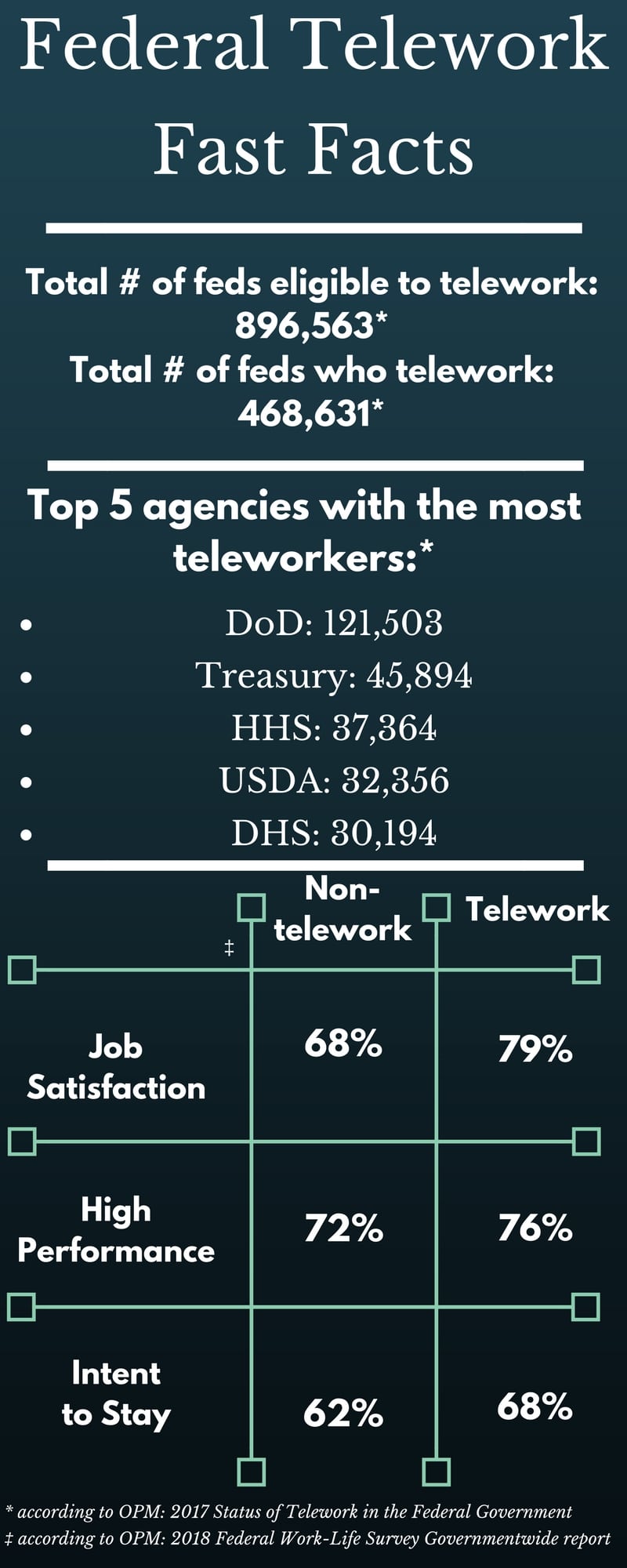

Federal employees are hearing a lot of mixed messages about telework these days, so Federal News Radio set out to answer their most common questions.
Federal employees are hearing a lot of mixed messages about telework these days. The Telework Enhancement Act of 2010 requires agencies to create a telework plan and fulfill certain requirements to encourage its use. The Office of Personnel Management recently conducted a work-life study that determined employees who take advantage of telework are both more likely to perform highly and be happier in their jobs than their coworkers who don’t telework. And yet the Department of Agriculture just rolled back telework for more than 32,000 employees.
So Federal News Radio surveyed feds to find out what questions they had about telework. Of the more than 70 different questions we received, most of them revolved around these five topics:
The disconnect exists in the way authority over telework is distributed. OPM doesn’t actually have that much power over telework. It provides policy guidance and consultation to agencies. It also assists them in establishing goals, both quantitative and qualitative. But it can’t actually dictate telework policy to any agency.
The agencies have more authority, in that they can decide the range of telework possibilities for employees. Agencies decide which positions are eligible for telework and possible telework schedules. Additionally, they designate a Telework Managing Officer and ensure that every teleworker has a written agreement outlining their specific plan. Agencies are also responsible for ensuring employees and managers complete telework training programs.
The TMO is the person within the agency who is accountable for the telework program. This person advises agency leadership, and acts as OPM’s point of contact within the agency on telework matters. He or she also set the goals and metrics that measure the success of the program.
Meanwhile, direct authority over federal employees’ individual telework agreements, including whether or not they can telework and how often, resides with the employees’ supervisors. While OPM’s guidance and the provisions laid out in the Telework Enhancement Act apply uniformly to all agencies, at the employee level, telework is considered a privilege, not a right, and is handled on a case-by-case basis.

First, it’s important to note that supervisors cannot force anyone to telework. It’s entirely a voluntary program.
Supervisors basically have the final say over whether an employee can or can’t telework. They’re tasked with encouraging or discouraging the use of telework in their particular offices as they see fit. That means some offices will be friendlier to teleworkers than others, despite the official stances of OPM or the agency’s leadership.
In fact, in 2017, the Government Accountability Office did a study of telework at four agencies. One of the things GAO found was this variation causes many federal employees to believe that their agency is inconsistently implementing the telework program.
Supervisors are also responsible for making sure teleworking employees are meeting their productivity requirements. OPM emphasizes on Telework.gov that teleworkers have to be held to the same performance standards as their non-teleworking colleagues. The website also states that managers should focus more on results rather than physical presence.
That said, some agencies have also developed tools that can monitor teleworkers’ activity on agency networks as another way to ensure teleworkers aren’t abusing the program.
Supervisors can also suspend or terminate an employee’s telework agreement if they believe teleworking has an adverse effect on the employee’s or organization’s performance.
There are several requirements that must be fulfilled when a manager officially denies an employee the ability to telework. Some of those include that the denial has to be provided in writing, must give an explanation for the denial, and must include any appeals or grievance procedures.
Employees can also contact a telework coordinator, who is responsible for routine implementation of telework at their agency. OPM has a tool that can help feds find contact information for their telework coordinators.
Federal employees are required to complete telework training courses if they wish to telework. Managers have to undergo telework training as well, whether they telework themselves or simply oversee employees who do so.
OPM makes various courses and webcasts available for employees and managers to use in their training, including subjects like teleworking fundamentals, performance management and dependent care.
The training for employees also covers topics like how to stay connected to the office, and other practical aspects. The management training covers designing a telework program and effectively supervising telework employees.
However, that same GAO study found that three of the four agencies it looked at had no mechanism for verifying that management had completed its training, nor did they require managers to complete the telework training before approving or denying employee telework requests.
OPM released a report in March after it conducted a study on work-life balance programs like telework.
Specifically, OPM found federal employees who telework or participate in one of their agency’s wellness programs are more likely to receive a rating of “exceeds fully successful” on their last performance appraisal than those who did not participate in one of these programs, according to OPM’s inaugural study of government work-life programs. About 76 percent of teleworking employees reported high performance ratings compared to 72 percent of non-teleworking employees.
In addition, employees who engaged in telework, work flexibilities or health and wellness programs were significantly more satisfied with their jobs. Anywhere from 75 to 79 percent of employees who participated in one of these programs said they were happy with their jobs, compared to 67 to 72 percent of federal workers who didn’t engage with these programs.
While it’s far too early to expect any kind of quantitative data on the results of the telework crackdown at USDA, employees of the department have reached out since then to express dissatisfaction, and report low morale.
This was an attempt to answer some of the most common questions feds posed to us through an open survey. If you have more questions about telework, please submit them here:
Create your own user feedback survey
Copyright © 2024 Federal News Network. All rights reserved. This website is not intended for users located within the European Economic Area.
Daisy Thornton is Federal News Network’s digital managing editor. In addition to her editing responsibilities, she covers federal management, workforce and technology issues. She is also the commentary editor; email her your letters to the editor and pitches for contributed bylines.
Follow @dthorntonWFED


